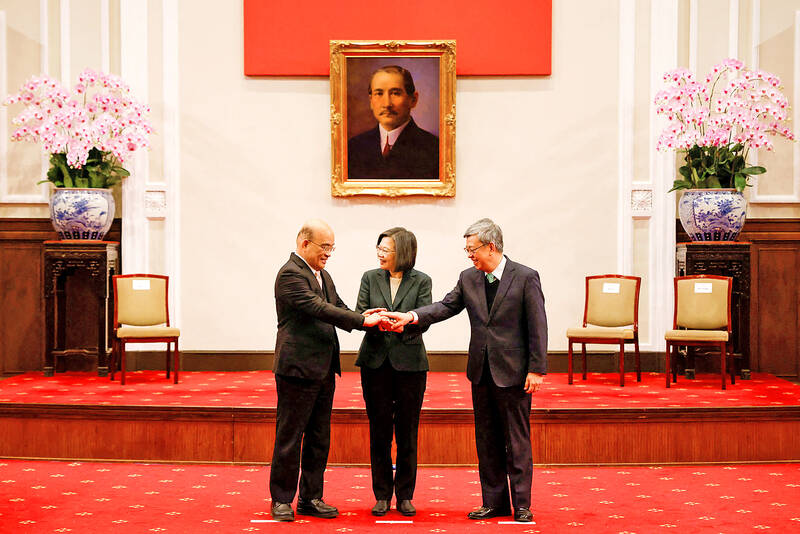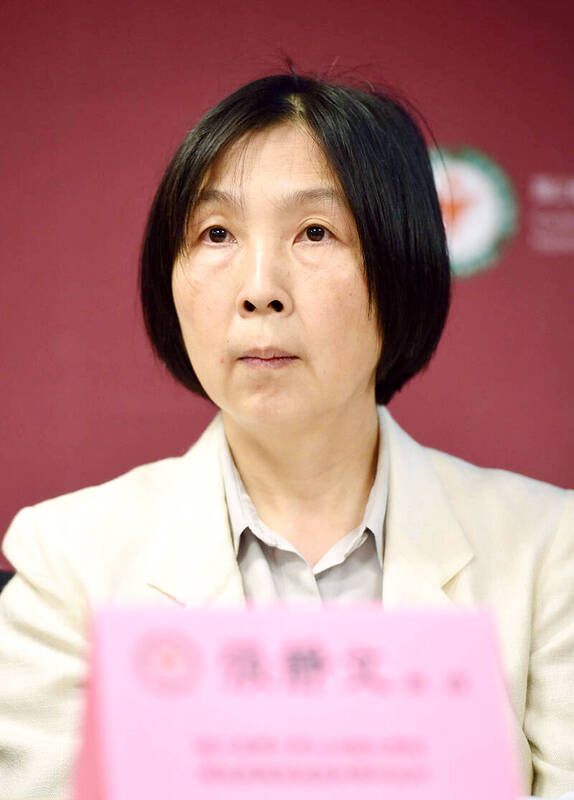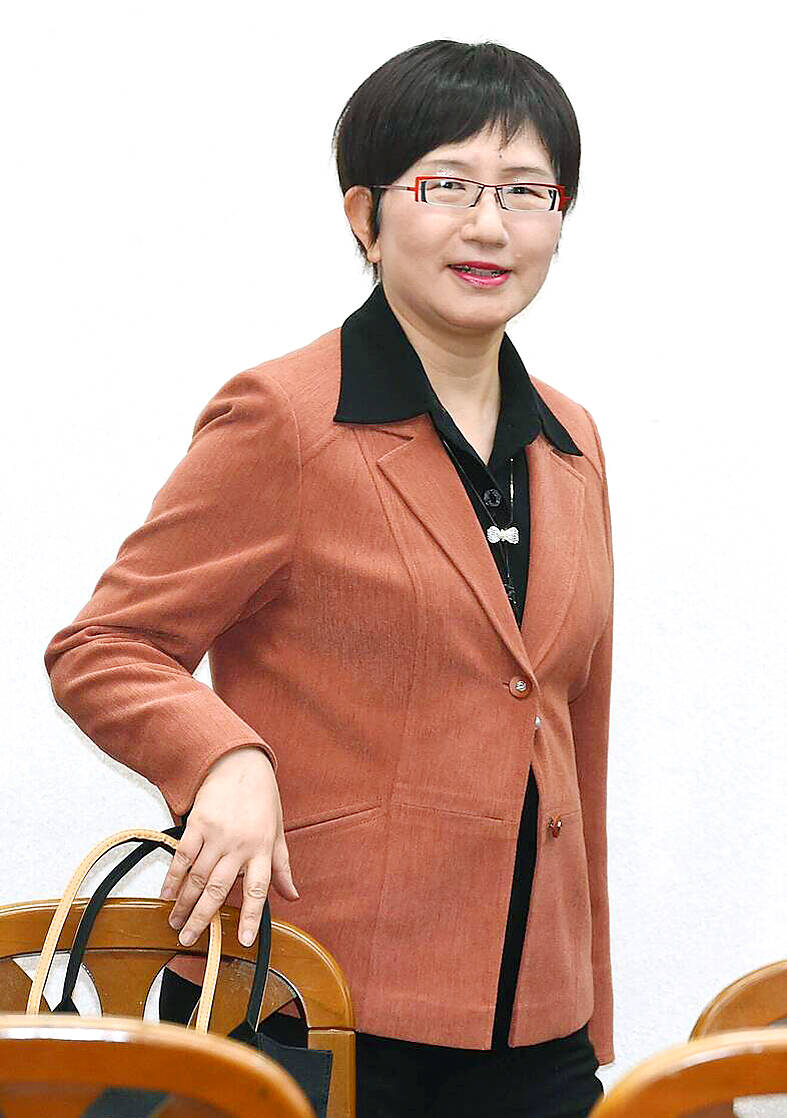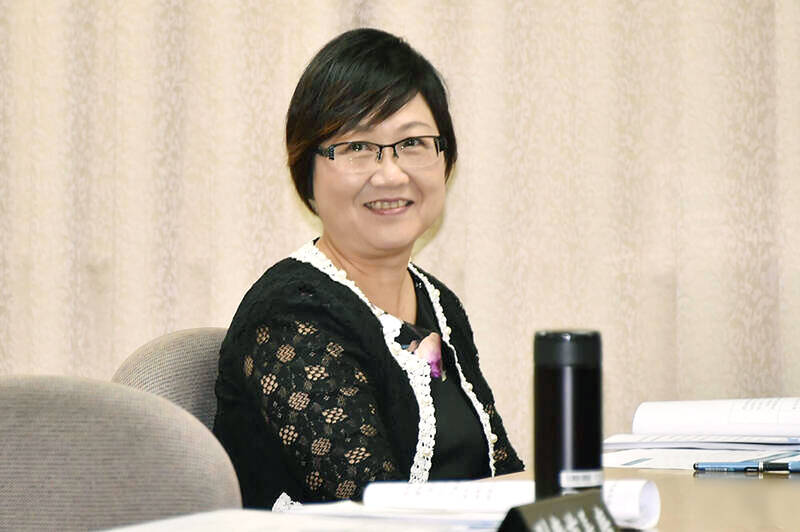President Tsai Ing-wen yesterday (蔡英文) appointed former vice president Chen Chien-jen (陳建仁) as the new premier.
The appointment of Chen, who vowed to bolster Taiwan’s economic, environmental and societal tenacity, is part of a Cabinet reshuffle after former premier Su Tseng-chang (蘇貞昌) announced the resignation of his Cabinet on Thursday last week.
Su’s Cabinet is to resign on Monday, and a handover ceremony is to be held the following day, Cabinet spokesman Lo Ping-cheng (羅秉成) said in a statement.

Photo: Carlos Garcia Rawlins, REUTERS
Addressing a news conference in Taipei, Chen thanked Su for stabilizing the country, helping Tsai win re-election and leading the fight against the COVID-19 pandemic.
Su’s Cabinet won the trust of Taiwanese as it introduced policies that bolstered economic development and led Taiwan to gain recognition from the world, he said.
Having worked with several premiers, Chen said that Su’s achievements were “indeed not easy.”

Photo: Taipei Times file photo
Taiwan “has reached new heights” in terms of economic prowess and international status under Tsai, Chen said, adding that the government transformed Taiwan into an ideal nation for its inhabitants.
“I will shoulder the responsibility without hesitation during the rest of Tsai’s term,” he said.
Chen said that while he loves conducting research, he is happy to contribute his strengths when the nation is in need.

Photo: Taipei Times file photo
He said he feels fortunate to live in such a free and democratic country.
Although Taiwan’s fight against the pandemic has been more effective than most countries, the government has to increase its efforts to help the economy recover, he said.
The new Cabinet must continue the policies that have benefited the country, but adjust its approach to promote post-pandemic recovery, boost social security, improve infrastructure and develop six core strategic industries: information and communication technology, information security, precision healthcare, defense, renewable energy and wartime necessities, Chen said.

Photo: Taipei Times file photo
The government should also be more aware of public opinion, pay more attention to communication, and provide care for families and disadvantaged people, he added.
Tsai thanked Su for taking up the position in the most difficult time and praised him as “the key force that supports the nation.”
Su’s Cabinet went all-out to keep African swine fever at bay, combat the COVID-19 pandemic and ensure the nation’s water supply, she said.
Taiwan not only overcame those difficulties, but helped the public maintain a normal life and won support from democratic partners around the globe, she added.
From passing a marriage equality bill to allowing imports of US pork and beef products, and reforming military service, Su has always been supportive, she said, adding that he “made the impossible possible,” including installing air-conditioners in each classroom in the nation’s public elementary, junior-high and high schools, moving the cables along the highway to Pingtung County’s Oluanpi (鵝鑾鼻) underground and completing the electrical upgrades to the South-Link Line of the Taiwan Railways Administration, she said.
“The script of life has been written long ago. There is no way to peek at it so I can only go all-out,” she quoted Su as saying.
She hopes that the new Cabinet can be “warm and tough” to face the many challenges to come, she said.
Tsai said she hopes that Chen can use his expertise in science to help cement Taiwan’s advantages in the semiconductor industry, further boost the nation’s competitiveness and stabilize the economy.
Meanwhile, rumors that Representative to the US Hsiao Bi-khim (蕭美琴) and Minister of Foreign Affairs Joseph Wu (吳釗燮) would switch posts are untrue, the Chinese-language Liberty Times (the sister newspaper of the Taipei Times) reported.
Hsiao is to stay in Washington, where she would continue to play a key role in communicating with the US on behalf of Taiwan, it said.
The Liberty Times also reported that three more women would become ministers. Deputy Minister of Finance Chuang Tsui-yun (莊翠雲), Overseas Community Affairs Council Deputy Minister Hsu Chia-ching (徐佳青) and Atomic Energy Council Deputy Minister Chang Ching-wen (張靜文) would be promoted to head their respective agencies, it said.
Ministers without portfolio Lin Wan-yi (林萬億), Chang Ching-sen (張景森), Wu Tze-cheng (吳澤成), John Deng (鄧振中), Lo Ping-cheng (羅秉成), Kung Ming-hsin (龔明鑫), Huang Chih-ta (黃致達) and Wu Tsung-tsong (吳政忠) would retain their posts, it added.
Additional reporting by Tzou Jiing-wen and CNA

INVESTIGATION: The case is the latest instance of a DPP figure being implicated in an espionage network accused of allegedly leaking information to Chinese intelligence Democratic Progressive Party (DPP) member Ho Jen-chieh (何仁傑) was detained and held incommunicado yesterday on suspicion of spying for China during his tenure as assistant to then-minister of foreign affairs Joseph Wu (吳釗燮). The Taipei District Prosecutors’ Office said Ho was implicated during its investigation into alleged spying activities by former Presidential Office consultant Wu Shang-yu (吳尚雨). Prosecutors said there is reason to believe Ho breached the National Security Act (國家安全法) by leaking classified Ministry of Foreign Affairs information to Chinese intelligence. Following interrogation, prosecutors petitioned the Taipei District Court to detain Ho, citing concerns over potential collusion or tampering of evidence. The

‘FORM OF PROTEST’: The German Institute Taipei said it was ‘shocked’ to see Nazi symbolism used in connection with political aims as it condemned the incident Sung Chien-liang (宋建樑), who led efforts to recall Democratic Progressive Party (DPP) Legislator Lee Kun-cheng (李坤城), was released on bail of NT$80,000 yesterday amid an outcry over a Nazi armband he wore to questioning the night before. Sung arrived at the New Taipei City District Prosecutors’ Office for questioning in a recall petition forgery case on Tuesday night wearing a red armband bearing a swastika, carrying a copy of Adolf Hitler’s Mein Kampf and giving a Nazi salute. Sung left the building at 1:15am without the armband and apparently covering the book with a coat. This is a serious international scandal and Chinese

Seventy percent of middle and elementary schools now conduct English classes entirely in English, the Ministry of Education said, as it encourages schools nationwide to adopt this practice Minister of Education (MOE) Cheng Ying-yao (鄭英耀) is scheduled to present a report on the government’s bilingual education policy to the Legislative Yuan’s Education and Culture Committee today. The report would outline strategies aimed at expanding access to education, reducing regional disparities and improving talent cultivation. Implementation of bilingual education policies has varied across local governments, occasionally drawing public criticism. For example, some schools have required teachers of non-English subjects to pass English proficiency

TRADE: The premier pledged safeguards on ‘Made in Taiwan’ labeling, anti-dumping measures and stricter export controls to strengthen its position in trade talks Products labeled “made in Taiwan” must be genuinely made in Taiwan, Premier Cho Jung-tai (卓榮泰) said yesterday, vowing to enforce strict safeguards against “origin laundering” and initiate anti-dumping investigations to prevent China dumping its products in Taiwan. Cho made the remarks in a discussion session with representatives from industries in Kaohsiung. In response to the US government’s recent announcement of “reciprocal” tariffs on its trading partners, President William Lai (賴清德) and Cho last week began a series of consultations with industry leaders nationwide to gather feedback and address concerns. Taiwanese and US officials held a videoconference on Friday evening to discuss the